

Stress, Career Aspirations, and Other Headlines
We hope that so far we've described the Business Chemistry types in a way that allows you to see yourself in them, and also your colleague Joe, and maybe even your mom. We've aimed for colorful descriptions, attempting to paint pictures that make the types come alive (but hopefully not like those creepy pictures where the eyes seem to follow you around the room.) However, for those readers pining for more numbers and graphs, here they come. (If you don't want to look at graphs, no worries; we think you'll find the text interesting as well, so just focus on that and let those charts be a colorful blur in your peripheral vision).
Our initial research established the Business Chemistry types, the traits associated with them, and the key differences between them. Since then we've gained a deeper understanding of how the types are similar and different via a number of large-scale research studies we've conducted with professionals all over the world, and through in-person sessions with thousands of executives and their teams. We've looked for differences in relation to a number of factors, from reactions to stress, to career aspirations, to the conditions under which each type thrives, and we've found significant differences between the types every time. We'll focus here primarily on key findings, but for more detail on our research samples and methodologies, check out the appendix. (Maybe next we'll do a study on Business Chemistry differences in the likelihood of reading appendices.)
Stress!
There's a Randy Glasbergen cartoon from 1996 that shows one white-coated individual telling another: “According to the latest scientific research, the average human body is 20% water and 80% stress.”1 You may be thinking that sounds about right, even now, 20 years later. And if you were to do a quick Internet search on stress in the workplace, you might feel your own stress levels rise as you read all the dire warnings about the epidemic proportions and dangers of the stressed out workforce in the United States and elsewhere. And we're not going to suggest that stress isn't common or that it can't be dangerous (although there is evidence it can have positive effects too). However, we do feel compelled to say right off the bat that our research on stress'a study conducted with more than 23,000 professionals—suggests that not everyone is as stressed out all the time as we might be led to believe by the popularity of this topic in the media. When we asked people about their stress levels, just 28 percent said they're stressed often or almost always. Frankly, given the hype, this finding surprised us a little bit.
But it didn't surprise us that we found significant Business Chemistry differences in how much stress people experience. Specifically, our study suggests that Guardians are most likely to experience stress, followed by Integrators. And given everything we've just shared about the types, that's what we might expect.
Who's stressed out?
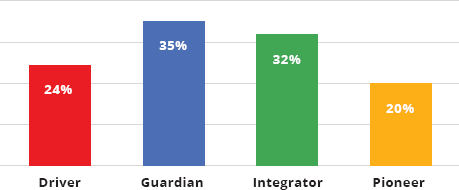
So what are Guardians and Integrators stressed about? We asked the same professionals about various potentially stressful situations and found that making an error topped the list, causing stress for more than 80% of all respondents. The other things we inquired about were experienced as stressful by roughly half of respondents. These included:
 a challenging workload, with long hours or juggling of multiple responsibilities
a challenging workload, with long hours or juggling of multiple responsibilities moments of conflict, like getting reprimanded or delivering a difficult message
moments of conflict, like getting reprimanded or delivering a difficult message situations that create urgency, like critical projects or time pressure
situations that create urgency, like critical projects or time pressure face-to-face interactions, like delivering a presentation or meeting a new stakeholder.
face-to-face interactions, like delivering a presentation or meeting a new stakeholder.
We're getting a little stressed out just thinking about all of it. Are you?
Our next question was whether different Business Chemistry types are stressed out by different things, and the answer to that question is a pretty clear “no.” The nature of the stressor didn't seem to impact which types experienced it as stressful. Guardians and Integrators indicated they experienced every situation to be significantly more stressful than did Pioneers and Drivers.
Spending a little time with us would illustrate this finding perhaps more clearly than anything else. In all kinds of situations Suzanne, a Guardian-Integrator, is often struggling to stem her mounting panic, while Kim, a Pioneer-Driver, is as cool as a cucumber. While writing this book, for example, Suzanne was constantly fretting about the timeline and whether we'd manage to get everything done, and Kim would reply, “I'm not worried, we're doing great!”
Findings from a second study we conducted with 17,000 different professionals suggest Guardians and Integrators are also less likely to feel they're effective under stress. But before you draw the conclusion that they can't take the heat, we should note that half of Guardians and Integrators reported they're most effective when moderately to very stressed, compared to around 60% of Drivers and Pioneers. So yes, we found a statistically significant difference, but all types have substantial portions of people who say they work well under stress (Suzanne just doesn't happen to be one of them).
Our research also suggests that introversion and extroversion play an important role in how much stress people experience. Among the Integrator subtypes, Dreamers, who tend to be introverted, reported stress levels similar to Guardians, while Teamers experienced more modest levels. On the flip side, among the Driver subtypes, Commanders, who tend to be extroverted, reported stress levels similar to Pioneers, while Scientists reported higher levels.
Who's stressed out?
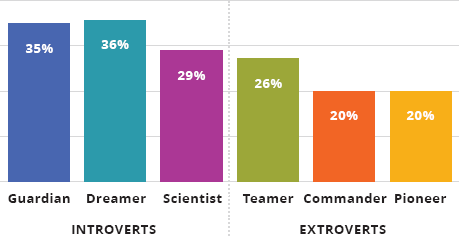
Why? Possibly due to physiological differences—there is evidence that Introverts have more sensitive neurological systems, which we talked about in the previous chapter. But it is also possibly due to differences in preferred ways of working and interacting with others, which may not always be aligned with typical work environments. It can be a tough world out there for Introverts, and it sometimes takes a toll.
So if some types—generally the more introverted ones—experience more stress than others, what do they do about it? We explored that question too in our second stress study. We found that when it comes to coping, jumping in and tackling the issue was the most common strategy overall, used by more than 80% of respondents. Other strategies that were almost as common were:
 cognitive coping strategies, like stepping back to look at the big picture, looking on the bright side, and thinking through possibilities
cognitive coping strategies, like stepping back to look at the big picture, looking on the bright side, and thinking through possibilities groundwork strategies, like gathering more information or doing organizational tasks
groundwork strategies, like gathering more information or doing organizational tasks
Two other strategies were reported by less than half of respondents, fewer than we might have expected based on what outside research suggests about the ways people cope:
 interpersonal strategies like asking someone for help, talking with someone about how you're feeling, or bouncing ideas off of them
interpersonal strategies like asking someone for help, talking with someone about how you're feeling, or bouncing ideas off of them time-out strategies, like doing something that energizes or relaxes you (e.g., yoga, going for a run), socializing, or blowing off steam.
time-out strategies, like doing something that energizes or relaxes you (e.g., yoga, going for a run), socializing, or blowing off steam.
And the Business Chemistry types reported using different strategies in varying degrees. While taking action was common among all types, it was reported most frequently by Drivers, with Pioneers close behind. This isn't surprising given the general bias of these types toward immediate action, with Guardians and Integrators being a bit more likely to think things through before jumping into action. Pioneers favored cognitive strategies more than other types did (after all, they love ideas!), and they used time-out strategies more than the other types. Pioneers also employed the most strategies overall, as you might expect from the most adaptable type. Guardians used groundwork strategies most often, which fits with their process- and detail-oriented natures. Integrators didn't show a strong preference for a particular coping strategy, using action, groundwork, and cognitive strategies to similar degrees. And while it was not their most common strategy, Integrators along with Pioneers, used interpersonal strategies more than other types. No doubt their relationship-orientation is a key factor here.
Use of coping strategies
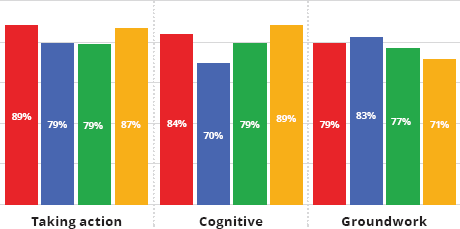

Psychological Safety
You know that colleague of yours who seems to blurt out whatever they're thinking in a meeting, no matter how outlandish or potentially controversial the idea? Chances are, that person has a strong sense of psychological safety—the feeling that it's okay to share one's ideas and take some interpersonal risks. The concept of psychological safety has been in the media spotlight over the past couple of years, in part because of some research conducted by Google.2 The general gist of their findings fits with what psychologists have previously found, that more successful teams tend to have a higher sense of psychological safety.3 After all, if some of your people are holding back, your team is missing out.
After reading about that study we got pretty interested in psychological safety ourselves, so with 11,000 professionals we explored whether there are Business Chemistry differences in the extent to which people feel safe or unsafe, not only when it comes to idea-sharing, but also in relation to some other areas. And although we queried a different sample of professionals, the results look a lot like those from our stress study.
Overall, Guardians and Integrators were the most likely to report feeling unsafe, and we saw an introversion/extroversion effect similar to the one in the stress study. Not only did Guardians feel significantly more unsafe than Pioneers, but Dreamers felt more unsafe than Teamers, and Scientists more than Commanders. Here are some specifics.
Starting with the most typical definition of psychological safety, around 35% of Guardians and Dreamers in our sample indicated they feel unsafe, saying it's rarely or only sometimes true that they feel they can share their ideas freely without fear of judgement or rejection. For Pioneers and Commanders this number was less than 15%.
Feels unsafe sharing their ideas freely at work
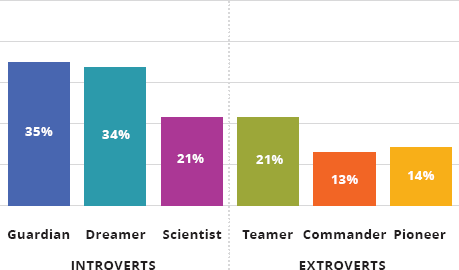
We've shared that in our definition a key difference between Introverts and Extroverts is that Introverts are quieter, particularly around new people. The findings from this study illuminate that distinction further, suggesting that part of the reason for this reserve may be a fear on the part of Introverts that what they have to say will be judged or rejected.
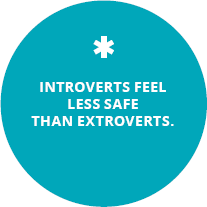
Extroverts, on the other hand, maybe can't fathom why anyone would judge or reject their ideas, or, possibly, they simply don't care. After all, as we discussed in the previous chapter, we're living in the time of the Extrovert ideal, characterized by Susan Cain as the higher societal value placed on charisma and outspokenness than on character and reserve.4
We also explored some other aspects of feeling unsafe at work. When it comes to honestly discussing how they're feeling when stressed, Guardians were most likely to feel unsafe, and again, there was a clear introversion/extroversion effect; Dreamers and Scientists joined Guardians in being more likely to indicate this is a challenge. Teamers and Commanders, like Pioneers, were less likely to think so. If you're paying attention, you might notice that our findings suggest those who feel most stressed also feel least safe discussing it. Would talking about it more help? Studies suggest it might.5
Feels unsafe discussing stress levels with their manager
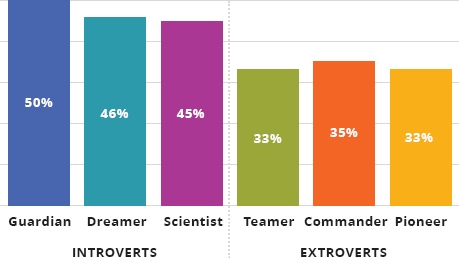
The pattern of results was almost identical in terms of whether people feel they can bring their whole selves to work, with more Guardians, Dreamers, and Scientists indicating they weren't so sure. Again, this may relate to the Extrovert ideal—if they're aware, consciously or unconsciously, that their way of being in the world is less valued, Introverts are likely to feel less comfortable being themselves. Can you blame them?
Feels unsafe bringing their whole self to work

In terms of feeling they're able to take care of their physical health, Dreamers were particularly challenged, while Commanders were the least likely to say this is a problem. And it's Dreamers and Guardians that were most likely to indicate difficulties with creating work–life boundaries without fear or guilt. These results are particularly significant in light of our findings on career priorities described below. Spoiler alert: Guardians and Integrators prioritize work–life balance more than Drivers and Pioneers. This leads us to wonder, what's the impact for individuals and organizations when those who most value work–life balance feel least able to attain it?
Feels unsafe taking care of their physical health
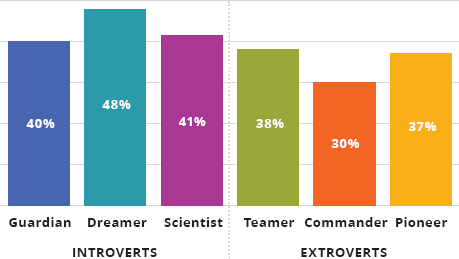
Feels unsafe creating work/life boundaries

Locus of Control
When we realized the parallels between our findings about stress and about psychological safety, we started wondering about chickens and eggs. Are Guardians and their introverted compatriots more stressed because they feel unsafe? Or do their feelings of discomfort spring from their higher stress levels? Or is something else going on? And while we were at it, we wondered what makes Pioneers, and their extroverted friends, so comparatively carefree and secure?
We looked into one psychological construct with potential to illuminate at least part of what's going on—good ol' locus of control. Remember that from your psychology 101 class? People with an internal locus of control believe what happens in their lives is primarily a result of their own actions, while those with an external locus of control believe outside factors ultimately determine their fate. For example, someone with a more internal locus of control would tend to believe that they'll be promoted if they work hard. On the other hand, someone with a more external locus of control might feel their own work ethic won't be enough if the boss likes the other candidate's style more, or if someone else is in the right place at the right time. Reality probably falls somewhere in between.
Prior research has shown relationships between a more external locus of control and both higher stress levels and lower psychological safety.6 We wondered about the relationship of locus of control with Business Chemistry, so we asked 9,000 of the same professionals from the psychological safety study whether they feel in control of their destiny when it comes to work. All the types had a more internal than external locus of control, but we still found differences, and again a strong introversion/extroversion effect. The extroverted Pioneers, Commanders, and Teamers all showed a strong internal locus of control, while the Introverts—Guardians, Dreamers, and Scientists—all scored comparably lower.
Internal locus of control:
“I am in control of my destiny when it comes to work.”

If their natural style is less valued, is it possible that Introverts have had more experiences that tell them they don't control their level of success, at least not as long as they're being themselves? Instead, societal or managerial preferences for Extroverts may be seen as having a strong impact on whether introverted types succeed.
Other research suggests there might be something to this. Studies have found that groups facing societal or institutional biases or incidents of prejudice, such as African Americans and LGBTQ individuals, have a higher external locus of control.7 8
And not to give anything away, but the extent to which the types feel they can control their destiny is particularly interesting in light of what we're about to tell you in relation to career aspirations and leadership. So let's get right to that.
Career Aspirations
Did you know that not everyone aspires to be a leader? No really, it's true! Sometimes you'd never know it from the way leadership is talked about in organizations and in the media. Becoming a leader is often represented as the holy-grail we're all searching for… the brass ring we're all trying to grab. The assumption seems to be that we all want to lead, or at least those of us who have any ambition or talent do. But our research suggests that's not true. We asked almost 14,000 professionals across various organizational levels about their career aspirations, requesting they choose their top three aspirations out of a list of ten. We found there are lots of ways beyond traditional leadership that people of all Business Chemistry types want to contribute in their organizations. That said, let's go ahead and get the leadership stuff out of the way first, then we'll tell you about the other roles people aspire to.
The majority of Pioneers and Drivers (more than 65%) said that being a leader is a top career aspiration. In contrast, about half of Guardians and Integrators did. So there's a significant Business Chemistry difference here, but there are two important things we want to highlight. The first is that more than 30% of Drivers and Pioneers did not say they aspire to leadership. That, paired with the even larger number of Guardians and Integrators who didn't, clearly debunks the notion that everyone wants to be a leader. But the second key point is equally important. While their numbers were lower, plenty of Guardians and Integrators want to lead (and indeed plenty of them do lead, as you'll see in the next chapter).
Equally interesting is the role introversion and extroversion play here. When it comes to the Driver subtypes, we see a sizeable difference, with the more extroverted Commanders being the most likely of all types to have leadership aspirations, significantly more than even Pioneers. But the more introverted Scientists weren't quite as keen on the idea. There are also differences between the Integrator subtypes, with the more introverted Dreamers being the least likely of all to set their sights on leadership, even less than Guardians, and the more extroverted Teamers looking a bit more like Scientists in this regard.
“When it comes to my career, I most aspire to be a leader.”
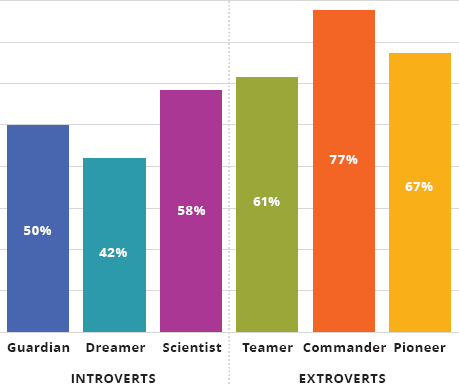
So the three more introverted types were less likely to aspire to leadership roles (on average half did) than the three more extroverted types (on average almost 70% did). This is particularly interesting in light of the other findings we just shared—that the introverted types are more stressed, feel less psychologically safe, and have less of an internal locus of control. Huh.
We can't help but wonder if there aren't some parallels between what we're seeing here and the so-called ambition gap that Sheryl Sandberg addresses in her book Lean In: Women, Work, and the Will to Lead.9 Sandberg compiles research suggesting that women are less likely to aspire to leadership, at least in part, because of the bias and sexism that still exists in many of today's workplaces and in society as a whole. We'll address gender as it relates to Business Chemistry in the next chapter, but at this point we'll simply suggest that Introverts' lower likelihood of aspiring to lead may be a reflection of similar ongoing experiences of bias against Introverts.
At the same time, it's also possible that many Introverts don't relish the thought of a leadership role for other reasons that we'll explore shortly. We're not suggesting everyone should want to lead, simply that the patterns in our findings suggest a powerful opportunity for future inquiry in this area.
But just when you might be starting to think all of our studies have essentially the same findings, we'll note that leadership is the only aspiration where we saw the types divided neatly along the lines of introversion and extroversion. When it comes to the other aspirations we asked about, we saw different patterns. In other words, if you've gotten a little lazy and are no longer paying close attention, time to perk back up!
So if leadership isn't the only game in town, what else are people aspiring to? For one thing, they want to be top performers. Around half of Guardians and Drivers indicated this, whereas fewer Pioneers and Integrators did.
“When it comes to my career, I most aspire to be a top performer.”

As they're the most competitive and focused type, we're not surprised to see Drivers in the lead here. And we think the relatively high Guardian number suggests their more modest emphasis on leading is less about any lack of ambition or willingness to work hard, and more about possibly preferring a role that's more behind the scenes. Not to suggest that Integrators and Pioneers don't work hard—but they may be a little less concerned about how their performance compares to others. Integrators tend to have more of an intrinsic versus competitive motivation and Pioneers, well, they like to color outside the lines.
We see a similar overall pattern when it comes to aspirations to be experts, but with some interesting subtype differences—overall around 35% of Guardians and Drivers saw the appeal of such a role, more than Pioneers or Integrators, who are closer to the 20% range. Between the Driver subtypes it was Scientists, in particular, whose goals lie here more than Commanders. This makes a lot of sense since Scientists are the most intensely curious of the types—they like to dive deep on a topic that interests them.
“When it comes to my career, I most aspire to be an expert.”

“When it comes to my career, I most aspire to be an innovator.”
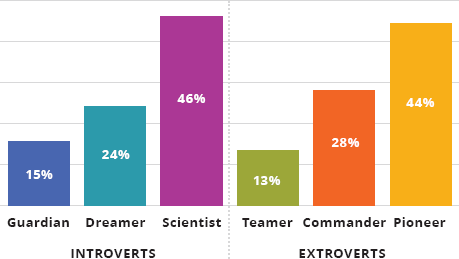
Scientists were also likely to aspire to be innovators (as were Pioneers), again showing a sizeable difference from Commanders, and also from Guardians and both types of Integrators. Since they're the most experimental of the types, we might expect this innovation to take the form of exploring various options, prototyping, and failing fast. (Hopefully with some successes mixed in!)
So while Scientists are less likely than their Commander colleagues to want to lead in the traditional sense, they have higher aspirations than Commanders when it comes to these other ways of leading in their fields, as experts and innovators.
Many people also aspire to roles that are more collaborative in nature—a greater percentage of Guardians and Integrators than Pioneers and Drivers said they aspire to be team players. And we see a similar division in relation to aspirations to mentor, with more Guardians and Integrators setting their sights here.
“When it comes to my career, I most aspire to be a team player.”
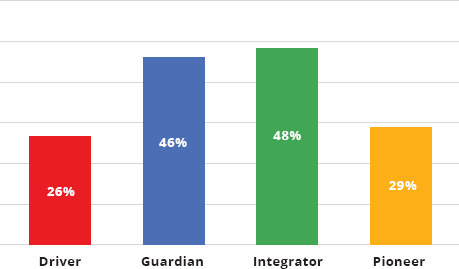
“When it comes to my career, I most aspire to be a mentor.”

So this, then, is where some of the Guardians and Integrators who don't aspire to lead in a traditional manner are putting their focus—on contributing to their teams and enabling others in a different way. Sometimes it seems becoming a leader is elevated above all other goals, but shouldn't these other kinds of contributions be equally recognized for the value they bring?
We think so. After all, what would our teams be like if no one wanted to be a team player? If we were all competing to be out front and in control? If no one was interested in pitching in to do whatever it takes, without the promise of glory, or often even a thank you, so that the whole team can succeed together? Furthermore, what would our organizations be like without mentors? Without those who measure their own success, at least in part, by the success of those who they've reached a hand back to help?
Career Priorities
If aspirations are about the future, priorities are more about the here and now, about living in the present. We asked the same group of professionals who told us about their career aspirations to choose their top three career priorities from a list of ten. Again we found plenty of interest.
One key difference is related to enjoyment. All the types placed a pretty strong emphasis on doing work they enjoy. After all, most of us spend an awful lot of time and energy at work, and it seems like a pretty grim existence not to enjoy it at all. But compared to the other types, Integrators placed the highest priority on enjoying both the work they do and the people they work with, while Drivers saw these things as less important. Perhaps this finding helps explain Integrators' stronger emphasis on the more collaborative aspirations of being team players and mentors—prioritizing who they work with and what they do more than what rung on the ladder they've reached. Dreamers, in particular, emphasized enjoying their work, while the Integrator subtypes were more similar to one another in regard to the importance of enjoying their colleagues.
“When it comes to my career, a top priority is doing work I enjoy.”
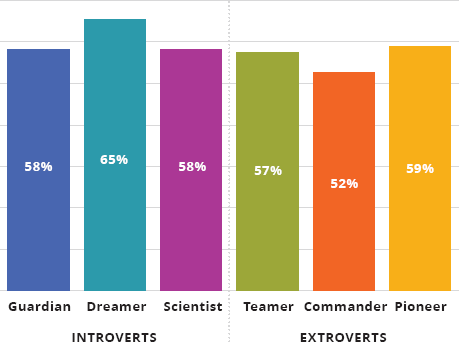
“When it comes to my career, a top priority is working with people I enjoy.”

When it comes to making a difference in the world, Pioneers prioritized it the most, followed by Integrators. While we can't say for sure, we suspect that making a difference may mean something different to these two types. For Pioneers, who aspire to lead and to innovate, it's likely to mean making a dent in the universe—having an impact on how things are done that will be important and remembered, maybe resulting in a comet or asteroid named after them. (Did you know there are asteroids named after James Bond and Santa?) For Integrators, who also have higher aspirations to be team players and mentors, we speculate it may mean making a positive difference in other people's lives, whether on an individual or collective level, even without the asteroid.
“When it comes to my career, a top priority is making a difference in the world.”

Now let's come back to work–life balance. We've already shared that Guardians and Integrators feel less able to set work–life boundaries than Pioneers and Drivers. Well it turns out, perhaps unfortunately, that when it comes to prioritizing work–life balance the pattern is the same—it was more important to Guardians and Integrators. Might this be because they're more likely to feel stressed more of the time? Regardless, it seems an unfortunate state of affairs that those who most value work–life balance feel least able to attain it. And again, we wonder, might this relate to those career aspirations? Leadership and work–life balance can be a tough mix, and this may be one reason that Guardians and Integrators place less emphasis on traditional leadership goals.
“When it comes to my career, a top priority is maintaining work-life balance.”

Advancement was a priority for Drivers more than the other types, and particularly for Commanders. This difference between the two Driver subtypes may reflect the Commander's more extroverted nature, with advancement representing a form of external acknowledgment for one's contributions, as well as upward movement toward the leadership roles Commanders desire. The comparatively lower scores of Scientists might reflect the fact that advancement often changes the nature of one's work, pulling them away from the more specialist kinds of roles (e.g., expert), which Scientists are more likely to value.
“When it comes to my career, a top priority is advancement.”
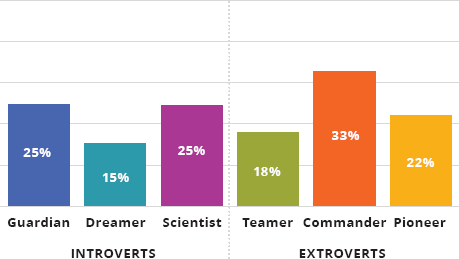
Perhaps as interesting as the differences between types is where we don't see them. All the types put a high priority on a feeling of accomplishment—it was a top priority for around 60% of each type, with Teamers, Commanders, and Guardians emphasizing it slightly more than Dreamers, Scientists, and Pioneers. And maybe this isn't so surprising, because really, who would want to spend 40 hours a week (or 60) at a job where you never accomplish anything? But it's important because it provides a telling clue for where to find common ground across types. If you want to create an environment that meets the needs of everyone at once, a strong focus on accomplishment might be a good place to start.

Conditions for Thriving
Speaking of getting stuff done, we were also curious about what the different Business Chemistry types need in order to feel like they're able to do their best work. So we asked the same group of people to select the top three (out of ten) conditions under which they're most likely to thrive. As usual, we found significant Business Chemistry differences.
Challenging tasks are what made Drivers tick. As the most competitive and goal-oriented type, Drivers likely relish knowing they've bested a particularly tough assignment. If the mountain isn't high or the river wide, why bother? And this fits right in with Drivers' desire to be high performers.
On the other hand, a sense that their work matters was most important to Integrators. This need may relate to Integrators' distinction as the type who feels the greatest duty to society and most wants to help others, as well as their aspirations to be team players and mentors. Maybe Integrators should adopt a variation of the unofficial U.S. Navy motto “Non sibi sed patriae” (“Not for self, but for country”), but the Integrator version might be “Not for self, but others.”
“At work, I thrive when I have tasks that are challenging.”

“At work, I thrive when I have a sense my work matters.”

The chance to learn and try new things was most embraced by Pioneers. This finding fits right in with what we know about the types' orientations toward novelty (which Pioneers crave) and the tried and true (which is embraced by both Guardians and Teamers, who have lower scores here). Knowing this, would a Pioneer likely enjoy a role where they mostly do the same thing over and over? We think not.
“At work, I thrive when I have opportunities to learn and try new things.”
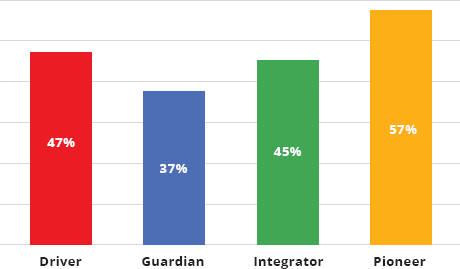
Clear expectations were more important for Guardians than for others (although it wasn't their top priority). As the type that most prefers structure and least tolerates ambiguity, Guardians likely appreciate clear expectations because they provide an explicit guide for how they should proceed. We've already learned that Guardians aspire to be top performers, and clear expectations help them know how to get there.
“At work, I thrive when I have clear expectations.”
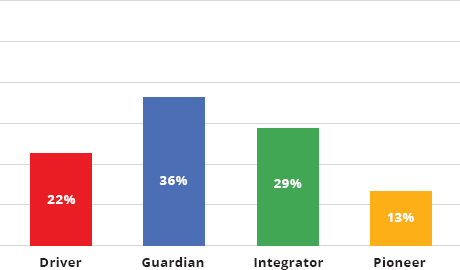
Is this everything there is to know about the differences between Business Chemistry types? Certainly not! Even if we're exhausted from trying to share so much in one chapter, our findings are not exhaustive. There are endless possibilities for future research which could help us understand the types even better. But we hope what we've shared here fills out those pictures of the types a bit more. Have you figured out your mom's type yet?
References
- 1. Glasbergen, Randy. Cartoon. Glasbergen Cartoon Service. www.glasbergen.com.
- 2. Duhigg, Charles. “Group Study.” The New York Times Magazine, February 28, 2016.
- 3. Edmondson, Amy C. and Zhike Lei. “Psychological Safety: The History, Renaissance, and Future of an Interpersonal Construct.” Annual Review of Organizational Psychology and Organizational Behavior. (2014) 1: 23–43. doi:10.1146/annurev-orgpsych-031413-091305.
- 4. Cain, Susan. Quiet: The Power of Introverts in a World That Can't Stop Talking. New York: Broadway Books, 2013.
- 5. McGonigal, Kelly. The Upside of Stress: Why Stress Is Good for You, and How to Get Good at It. New York: Avery, 2015.
- 6. Triplett, Suellen M. and Jennifer M.I. Loh. “The Moderating Role of Trust in the Relationship Between Work Locus of Control and Psychological Safety in Organisational Work Teams.” Australian Journal of Psychology. 2017. doi:10.1111/ajpy.12168.
- 7. Carter II, Larry W., Debra Mollen, and Nathan Grant Smith. “Locus of Control, Minority Stress, and Psychological Distress Among Lesbian, Gay, and Bisexual Individuals.” Journal of Counseling Psychology. November 4, 2013. Advance online publication. doi: 10.1037/a0034593.
- 8. Becker, Brian E., and Frank J. Krzystofiak. “The Influence of Labor Market Discrimination on Locus of Control.” Journal of Vocational Behavior 21, no. 1 (1982): 60–70. doi:10.1016/0001-8791(82)90053-7.
- 9. Sandberg, Sheryl, and Nell Scovell. Lean In: Women, Work, and the Will to Lead. New York: Alfred A. Knopf, 2013.
